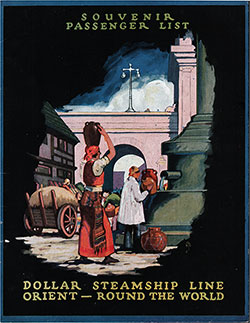Havana, Cuba Passenger Lists 1926-1933
Passenger Lists available from the GG Archives from the Port of Havana, Cuba. Organized by Date of Departure, Steamship Line, Steamship or Ocean Liner, Class of Passengers, Route, and the Ship's Captain.
Havana may be safely visited at any time between the first of November and first of May.
In fact, one of the most delightful winter excursions a traveler can make, is a trip to Havana with a short run into the interior of the Island. The entire novelty of climate and vegetation, and the facility of access to the great commercial city of Havana, presents a constant temptation to the man of business to combine profit with health and pleasure.

1926-09-30 SS President Van Buren Passenger List
Steamship Line: Dollar Steamship Line
Class of Passengers: Cabin Class
Date of Departure: 30 September 1926
Route: New York to Marseilles via Havana, Cristobal, Balbao, Los Angeles, San Francisco, Honolulu, Kobe, Shanghai, Hong Kong, Manilla, Singapore, Penang, Colombo, Port Said and Alexandria
Commander: Captain M. Ridley

1929-02-09 SS President Roosevelt Passenger List
Steamship Line: Ward Line
Class of Passengers: First Class
Date of Departure: 9 February 1929
Route: New York to Havana
Commander: Captain Theo. Van Beek, U.S.N.R.

1931-03-31 SS Aurania Passenger List
Steamship Line: Cunard Line
Class of Passengers: Cruise
Date of Departure: 31 March 1931
Route: Boston and New York to Bermuda, Nassau, Havana, New York, and Boston
Commander: Captain G. R. Dolphin, R.D., R.N.R.

1933-08-10 SS Franconia Passenger List
Steamship Line: Cunard Line
Class of Passengers: Cruise
Date of Departure: 10 August 1933
Route: Boston and New York to Havana, Nassau, and Bermuda
Commander: Captain J. C. Townley, R.D., R.N.R.
Cruising to Havana
On board of any of the fine steamships plying between New York and Havana, the trip is generally made in 4 days or less, at the end of which time the traveler finds himself amid scenery where towers the palm tree, and beautiful tropical vegetation prevails.
The approach to the Island of Cuba, and the city of Havana is so pleasing a sight that it should not be lost by travelers.
On arriving from the north, the first land usually made is the Pan de Matanzas, a high mountain about 54 miles from Havana.
The two round hills in the interior range bearing south, is the land mark for seamen running into Havana. As the harbor is approached, the city opens to full view.
The aspect of Havana, says Baron Humboldt, at the entrance of the port, is One of the gayest and most picturesque on the shore of equinoctial America north of the Equator.
Landing in Havana
As soon as the steamer has anchored, it is surrounded by a crowd of boats; but no one is allowed to board a newly arrived ship until the government official visits and examination are completed. The traveler will do well to decide before this time what Hotel he will go to.
Agents of the hotels will, after pointing out to them the baggage, take charge of it, and see that this is put into a boat,and when the passengers and baggage are embarked in the boats, the flotilla proceeds to land at the Machina. Here the baggage is inspected.
Travelers will find the Spanish officers courteous in the performance of their duties. After this examination, the passengers and baggage are conveyed to the hotel. The agent of the hotel can attend to all this for strangers, and they will find it best to let him pay the boat and carriage hire. [1]
[1] L. de F. Costales, Guide Book and General Directory for Travellers in Cuba, Second Edition, 1884, pp. 10-11.
⚠️ About Accuracy in Historical Records Research Tip
Context. The GG Archives presents passenger lists as faithfully as possible to the original documents. While OCR is generally accurate, portions of these collections—especially image captions and some transcriptions—are typed by hand and may include typographical or spelling variations. The original manifests themselves also contained clerical inconsistencies (names recorded phonetically, mid-voyage corrections, etc.).
What this means for your research:
- Search variant spellings of names (e.g., “Schmidt/Schmitt/Smith,” “Giuseppe/Joseph”).
- Cross-reference with immigration cards, passport applications, naturalization files, city directories, and newspapers.
- Treat manifests as primary sources with historical quirks—use them alongside corroborating records.
- For place names, consider historical borders and language variants (e.g., Danzig/Gdańsk, Trieste/Trst).
How to cite. When quoting a name from a manifest, consider adding [sic] for obvious misspellings and include a note such as “spelling as printed in original passenger list.”
Need help? If you spot a likely transcription error in captions, feel free to contact us with the page URL and a brief note—we love community input. 🙏
Curator’s Note
For over 25 years, I've been dedicated to a unique mission: tracking down, curating, preserving, scanning, and transcribing historical materials. These materials, carefully researched, organized, and enriched with context, live on here at the GG Archives. Each passenger list isn't just posted — it's a testament to our commitment to helping you see the people and stories behind the names.
It hasn't always been easy. In the early years, I wasn't sure the site would survive, and I often paid the hosting bills out of my own pocket. But I never built this site for the money — I built it because I love history and believe it's worth preserving. It's a labor of love that I've dedicated myself to, and I'm committed to keeping it going.
If you've found something here that helped your research, sparked a family story, or just made you smile, I'd love to hear about it. Your experiences and stories are the real reward for me. And if you'd like to help keep this labor of love going, there's a "Contribute to the Website" link tucked away on our About page.
📜 History is worth keeping. Thanks for visiting and keeping it alive with me.
